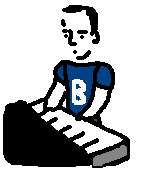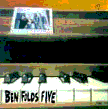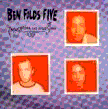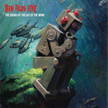Michael Bluejay's guide to

I made this logo as a gift for the band. It reads the same upside-down as rightside up. I was proud that when I gave it to Robert at a show in Apr. 1997, he remarked, "That's fucked up!" |
Contact | BF5 home | Michael Bluejay home
Last update: September 26, 2012 This site was selected as the MacroMusic |
Ben Folds Five newsSept. 2012. The
newly-reunited Ben Folds Five releases a new album, The Sound of
the Life of the Mind, and launches their first tour in over a
decade. The Magical Armchair has the
tour dates. Stuff on this site
|
Don't Shoot Me, I'm Only the Piano Player!Interview in Turntable Online (defunct)by Ryan Schreiber • March 196 They came from Chapel Hill, North Carolina, which has been called the indie rock capitol of the world. Of course, this is no ordinary garage band. Ben Folds Five is actually made up of three members who play piano, bass, drums, and no guitar. Throw that old Stratocaster out the window. We're gonna boogie for real tonight. Turntable: How come there's not five of you? Ben: I guess because we seem to only need three. Turntable: I can imagine a trumpet player in there, though. Ben: It's just an exaggeration. Turntable: How'd you get into music? Ben: I started playing piano when I was nine because one night my father got a piano as payment for some construction work he did. I just started playing. I also started playing drums then, too. Turntable: Were you classically trained or did you just teach yourself? Ben: A little of both. I had a year of formal training when I was nine and then I kind of bailed on that. I just kind of lost discipline after my first recital. I started pounding on it. Turntable: Do you write your songs about real-life people? Ben: Yeah, but the names are usually mixed up a little bit so that I can feel free to write about somebody without them exactly knowing that it's them. I'll take someone's name and put it in the wrong circumstances and twist them up. For instance, Uncle Walter, who has nothing to do with the woman who the song is actually about. And they don't know. There's a real Uncle Walter and there's a real person that the song came from. The two didn't have anything to do with each other and everybody's happy. Turntable: Are you surprised by your success? Ben: I think I'm surprised by seeing the inner-working of how success develops because I considered myself successful the day that I was making a living. But seeing a group develop and what it's really about is completely surprising and interesting to me. Turntable: Who, specifically, is "Underground" poking fun at? Ben: It's just exercising artistic freedom to put some different things together that I think are funny. I think it's funny to make a very happy, cabaret-sounding song about the underground of the indie rock world. I think it's funny to take those people and make them dance around like puppets and sing Bee Gees. That's part of why you write. It's the freedom to do stuff like that. If there's a statement in it at all -- and it's not the heaviest song obviously -- it's that the underground or indie scene or whatever you wanna call it is just a social club. It's just fun. They're not planning the next revolution. People get so fucking serious about it, but it's just like if you've got all the credit to apply for a country club, they're going to ask you the same questions. Turntable: I noticed a little piece from a Gershwin song at the end of "Philosophy." Was Gershwin a big influence? Ben: Actually, Gershwin is probably an influence, though I've never sat around and played or listened to much Gershwin. I think that if you're a musician, whether you like it or not, he's an influence, though I couldn't sit and quote everything that Gershwin had done. Turntable: What other influences did you have? The really big ones? Ben: Well, the really big ones, I have a feeling, I'm not so aware of because of the way I hear music and how early I was listening to music in a pretty thorough way. I think a lot of it came from hearing the radio when I was six years old even. And things come out and you go, "Wow! hat's what that was," but you don't realize it until later. And people that I really admire, I try to steer clear of it because I just don't feel you need to replicate it. I was using a lot of Joni Mitchell voicings on the piano, and also, I never listened to Lynyrd Skynyrd, but hell if my piano playing doesn't sound like that guy. It's really funny. I've never really listened to it, but I'm from the South, and that's my idea of piano playing. Turntable: I've had a recent fascination with the song "Sweet Home Alabama," and what a great song that is, but outside of that, I don't even know what "Freebird" sounds like. Anyway, what is the song "Jackson Cannery" about? Ben: Well, that's one of the images that hit me. It came from a guy who was riding the bus from college to work and he kind of was losing his shit at the time and he had the bus driver pull over and let him off and he ended up in Ireland trying to find U2. He's in and out of halfway homes and he's schizophrenic. What fascinated me was not that he was schizophrenic, but that at any point in your life, you can just quit. You can quit anything you want to. And I thought it was kind of dramatic, the idea of going, "Stop the bus." Everyone has to see you stop everything, and everybody has to stop with you and they let you off. I pulled the name Jackson from someone I knew who I thought worked too hard and the Cannery was a hosiery mill in North Carolina. So I just mixed the names up and I think the defining line in that song would be, "When seconds pass slowly and years go flying by." You know, just that every moment's a fucking drag and you look back and everything passed just in a second. Turntable: Where were you when you wrote "Boxing?" Ben: I was in transit a lot between Nashville and North Carolina. It kind of came from seeing my father's romantic fascination with boxing. All the people over at the house just to watch the Muhammad Ali fight, and I was like four or five years old. You know, he'd quit and he'd come back and he'd quit and he'd come back. So, those are the two quitting song. It's about quitting and not really wanting to quit. Turntable: What do you think of Tori Amos? Ben: Oh, I love Tori Amos. A lot of people just hate her, or they absolutely love her and I really like Tori Amos a lot. One of my favorite records I have in my collection right now is this bootleg Tori Amos record, "After the Rain." It's a great record. Turntable: I'm a really big Tori Amos fan myself. A huge one, in fact. Ben: Oh, good. I'm glad. I was afraid I'd lost you there because a lot of people are like... because someone asked me about "Forrest Gump" and I totally lost them on that and we ended up arguing about it. Turntable: I just picked up her new album, too. Ben: Is it good? Turntable: Well, I didn't really like the last one very much, especially in comparison to "Little Earthquakes," which is, in my opinion, the best album ever recorded. Ben: Yeah, I think that even if you don't like her, her music is what she does. Plus, she's like one of the greatest piano players you've heard playing pop music and she's such a good singer, too, that based on that, she should be huge. Turntable: Would you guys ever grow big beards a la ZZ Top? Ben: Hell no, but I think we would definitely pop on some moustaches in a heartbeat. Because, you know, when we did the record, I probably didn't shave for like two weeks, but at the end of the two weeks, I started experimenting and cutting off little bits of beard. I look so fucking bad with a beard, and even worse with a moustache. I always look like a used car salesman. Like Ron Howard or something. Turntable: Let's say that by presidential mandate, you have to add a guitarist. Who would it be? Ben: It'd either be the guy from Built to Spill, or the lead guitar guy in Radiohead. That guy's so damn good, and I really like the way he plays. Those are two different directions, but they're just two people who would understand. There's more humor in the Built to Spill player, and more stardom in the Radiohead guy, but they'd both stick. Turntable: So what did you do before you rocked the nation? Ben: I guess I rocked the country, and before that I rocked my bedroom. Maybe I'll rock the world now. [recovering from laughter] That's a funny question. Turntable: So you're from the same neck of the woods as Superchunk. If it came down to it, could you kick Mac McCaughan's ass? Ben: Could I? Let's see... [in deep contemplation] ...I've only been sitting next to him before. He looks pretty wiry. I think I could take him with my brother. Turntable: If your bass player died in a tragic basketball accident, would you become the Ben Folds Four? Ben: I think I'd turn the basketball on myself. Turntable: What is your philosophy? Ben: Ride to live. Relax and... um... biggie fry. |
 Ben, Darren, and Robert rode bicycles in the Uncle Walter video. If you ride a bike, check out my guide to How to Not Get Hit By Cars.  Ben told me in 1998 that Darren Jessee (BF5's drummer) is a vegetarian. Vegetarianism and even veganism are a lot more common now than they were in the 90s, so props to Jessee for being ahead of the curve on that one. Other vegetarian musicians include as Paul McCartney, Prince, Madonna, Natalie Merchant, and a host of others (including many you've never heard of, like me). Get the scoop on meatless diets on my Vegetarian Guide site. |




